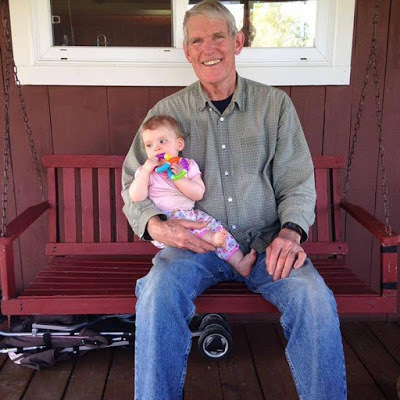Lori Hatcher's Blog: Refresh Blog, page 56
August 30, 2017
The Day I Lost My Fingerprints
 I’ve always taken my fingerprints for granted. Sitting there quietly at the end of my fingertips, they’ve been part of me since before I was born. I don’t think they’ve ever been officially recorded, but I remember making mouse pictures with them in third grade. My index finger, pressed onto an ink pad and transferred to paper, made the perfect mouse body. Add two pointy ears and a tail, and voila! a tiny rodent.
I’ve always taken my fingerprints for granted. Sitting there quietly at the end of my fingertips, they’ve been part of me since before I was born. I don’t think they’ve ever been officially recorded, but I remember making mouse pictures with them in third grade. My index finger, pressed onto an ink pad and transferred to paper, made the perfect mouse body. Add two pointy ears and a tail, and voila! a tiny rodent. Who would have thought that fingernail polish remover could not only wipe enamel from my nails but also two layers of skin from my fingers? But that’s what happened. When the last vestige of color was gone from my nails, so were my fingerprints.
 I didn’t discover they were gone until I tried to unlock my iPhone. Equipped with the latest technology against phone hackers, my phone unlocks with a simple touch of one fingertip. Usually. But not today. No amount of pressing or repositioning would convince my phone to recognize my fingerprint.
I didn’t discover they were gone until I tried to unlock my iPhone. Equipped with the latest technology against phone hackers, my phone unlocks with a simple touch of one fingertip. Usually. But not today. No amount of pressing or repositioning would convince my phone to recognize my fingerprint. A closer examination of my fingertips revealed why. Dried and cracked from the acetone in the nail polish remover, my prints no longer resembled my own. My iPhone was convinced I was a fraud.
“It’s me,” I said to my phone. “I promise.” But there was no convincing it. Only my pass code, another form of authentication, convinced it of my legitimacy.
Jesus experienced a similar situation after he had risen from the dead, only it didn’t involve an iPhone.
Appearing to his disciples the evening of his resurrection, he removed all doubt that he was, indeed, alive. Thomas, one of the twelve, was not with them. The next day, the other disciples told him, "We have seen the Lord!"
But Thomas refused to believe. "Unless I see the nail marks in his hands and put my finger where the nails were, and put my hand into his side, I will not believe it."
Thomas was a lot like my iPhone. He knew something was definitely wrong. He’d seen Jesus’ trial. Perhaps watched the soldiers flog him. He’d glimpsed Jesus’ face so bludgeoned and disfigured that he was unrecognizable. Not to mention the crown of thorns. And the crucifixion. And the spear in his side.
“This can’t be him,” he concluded. “This is nothing like the Jesus I knew. I need more proof. I will not believe.”
So Jesus, in his mercy, provided another means of authentication – his nail-pierced hands and riven side.
“A week later his disciples were in the house again, and Thomas was with them. Though the doors were locked, Jesus came and stood among them and said, ‘Peace be with you!’
“Then he said to Thomas, ‘Put your finger here; see my hands. Reach out your hand and put it into my side. Stop doubting and believe.’
Ashamed, Thomas said to him, “My Lord and my God!”
“Then Jesus told him, ‘Because you have seen me, you have believed; blessed are those who have not seen and yet have believed’" (John 20:24-27).
If you’re struggling to believe in Jesus, it’s OK to ask for more proof. Law student Josh McDowell did when he set out to disprove the facts of the resurrection. The preponderance of the evidence led him to place his faith in Jesus Christ. His resulting book, Evidence that Demands a Verdict, has sold millions of copies. For more than 40 years he’s traveled the world defending the faith he set out to discredit.
Atheist investigative journalist Lee Strobel also asked for more proof. Today he’s a rock-solid believer and one of the country’s foremost apologeticists, authoring books like The Case for Christ and The Case for Faith .
 If you’re honestly seeking God, he will reveal himself to you. He doesn’t have to. He’s God, and he answers to no man. But in his grace and mercy, he patiently yields to our feeble questions and provides the authentication we need – if we’re truly seeking to believe.
If you’re honestly seeking God, he will reveal himself to you. He doesn’t have to. He’s God, and he answers to no man. But in his grace and mercy, he patiently yields to our feeble questions and provides the authentication we need – if we’re truly seeking to believe. If you’re sincerely seeking Christ, you will find him. “You will seek me and find me,” he promises in Jeremiah 29:13, when you seek me with all your heart.”
When you find him, I pray you’ll unlock your heart and say with Thomas, “My Lord and my God.”
And when you’ve prayed that prayer of faith, God, unlike my iPhone, will never lock you out.
If you enjoyed this post, why not subscribe? I'll send you twice-weekly 5-minute devotions to help nourish your soul.
Because women need to connect with God in the craziness of life.
Enter your email address and VALIDATE the Feedburner email sent to your inbox.
Delivered by FeedBurner
If this post was meaningful to you, would you consider sharing it with a friend by clicking on one of the buttons below? Did you know you can receive bi-weekly Hungry for God posts sent directly to your email inbox? Visit http://www.lori-benotweary.blogspot.com and click on the link in the right hand corner to Subscribe Via Email.
Copyright 2012 by Lori Hatcher
Published on August 30, 2017 18:44
August 27, 2017
When Your World Is Falling Down 6 Steps to Take
 From the first crack to the final crash, I watched the collapse of the historic building. Granted, it was a movie, and the marble and stone were more likely Styrofoam and chicken wire, but the implosion was impressive.
From the first crack to the final crash, I watched the collapse of the historic building. Granted, it was a movie, and the marble and stone were more likely Styrofoam and chicken wire, but the implosion was impressive. As one crack led to two and a single crumbling pillar became an entire building teetering on destruction, I couldn’t help but parallel the movie scene with life. Sometimes our world seems as if it’s sliding into an abyss from which it can never climb out. Terrorism, political unrest, and societal disunity sound their doomsday cries from every news show. Struggling marriages, prodigal children, cancer, and sin discourage and defeat us.
And if threats from without aren’t enough, the voices from within steal our sleep and hound our days:
This is hopeless. Why keep trying? It’ll never get any better.
This is so bad, even God can’t fix this.
And the worst: If God loves us, why is this happening?
Sadly, the world has continued its march toward destruction since Eve took that first bite in the Garden.
But there is hope. Glorious hope.
God sees.
God hears.
God is intimately acquainted with all our ways.
And though we won’t see an end to the effects of sin in this life, we don’t have to wait until eternity to live victoriously.
Jehoshaphat was a man much like us. He loved God and wanted to honor him. In 2 Chronicles 20, he leaps from the pages as a man who could thoroughly understand the challenges of our day.
As the chapter opens, he’s got a problem bigger than the long-range missiles of North Korea. Scarier than than the Democrats fighting the Republicans. More destructive than the warring factions of our families.
Two huge armies with enough weapons and manpower to destroy the nation were knocking at his back door.
And “Jehoshaphat feared.”
Sometimes I fear, too.
This is why I’m thankful that, thousands of years after this event occurred, godly King Jehoshaphat show us what to do when fear comes knocking.
 1. Go to God first.
1. Go to God first. “Jehoshaphat resolved to inquire of the LORD. . .”
Going to God first acknowledges that he is our primary source of help and deliverance. Not our family. Not our friends. Not even our church or fellow believers. And while God will often use others to deliver us, he alone is the source.
2. Consider fasting. Invite other believers who share your same concerns to fast with you.
“. . . and he proclaimed a fast for all Judah. The people of Judah came together to seek help from the Lord” As
Jennifer Kennedy Dean, in Live a Praying Life, says, “Fasting is not a last-ditch effort to get through to God. Instead, it sharpens our spiritual senses so that God can get through to us.”
3. Remember what God has done for you in the past.
“Then Jehoshaphat stood up in the assembly of Judah and Jerusalem at the temple of the LORD in the front of the new courtyard and said: ‘O LORD, God of our fathers, are you not the God who is in heaven? You rule over all the kingdoms of the nations. Power and might are in your hand, and no one can withstand you. O our God, did you not drive out the inhabitants of this land before your people Israel and give it forever to the descendants of Abraham your friend?
When we recount God’s faithfulness, Dean says, “we allow God to build a foothold for our faith.”
4. Acknowledge your helplessness.
“We have no power to face this vast army that is attacking us,” Jehoshaphat said. It is in our times of absolute helplessness that God is most able to work. When we are totally dependent on him, he alone gets the glory for the victory.
5. Throw yourself on God’s mercy and stake your trust.
“We do not know what to do, but our eyes are upon you," Jehoshaphat prayed.
James 1:5 reminds us, “If any of you lacks wisdom, he should ask God, who gives generously to all without finding fault, and it will be given to him.” But we must ask in absolute faith that God has the power to do what is best in our situation. “He must believe and not doubt,” James 1:6 says, “because he who doubts is like a wave of the sea, blown and tossed by the wind. That man should not think he will receive anything from the Lord.”
6. Praise God for the answer that is coming.
“Jehoshaphat bowed with his face to the ground, and all the people of Judah and Jerusalem fell down in worship before the LORD. Then some Levites from the Kohathites and Korahites stood up and praised the LORD, the God of Israel.”
Praising God before the victory seems ludicrous and presumptuous, but if we believe the historical record of Scripture that tells us God works all things together for our good and his glory (Rom. 8:28), then we can praise him. Even though we don’t know how the matter will resolve.
“It’s not necessary,” Dean says, “ We stake our trust not in the outcome we hope for, but in the God who promises, “No eye has seen, no ear has heard, no mind has conceived what God has prepared for those who love him.”
Jehoshaphat’s victory can be ours as well. Listen to the Lord’s promise:
“Do not be afraid or discouraged because of this vast army. For the battle is not yours, but God's. . . .You will not have to fight this battle. Take up your positions; stand firm and see the deliverance the LORD will give you, O Judah and Jerusalem. Do not be afraid; do not be discouraged. Go out to face them tomorrow, and the LORD will be with you.”
I don’t know what battle you’re facing today, but the same God who fought for Jehoshaphat and the children of Judah fights for you. When fear and discouragement clamps their icy hands around your heart, go to God. Consider fasting. Remember what he’s done for you in the past. Acknowledge your helplessness. Throw yourself on his mercy, and praise him in advance for the victory.
May God be glorified in and through your struggle.
Now it's your turn. How has God shown himself mighty on your behalf when circumstances seemed hopeless? Leave a comment below and share your story.
If you enjoyed this post, why not subscribe? I'll send you twice-weekly 5-minute devotions to help nourish your soul.
Because women need to connect with God in the craziness of life.
Enter your email address and VALIDATE the Feedburner email sent to your inbox.
Delivered by FeedBurner
If this post was meaningful to you, would you consider sharing it with a friend by clicking on one of the buttons below? Did you know you can receive bi-weekly Hungry for God posts sent directly to your email inbox? Visit http://www.lori-benotweary.blogspot.com and click on the link in the right hand corner to Subscribe Via Email.
Copyright 2012 by Lori Hatcher
Published on August 27, 2017 18:18
August 21, 2017
5 Things the Eclipse Taught Me
 My eclipse-viewing venue wasn’t Pinterest- or Facebook-worthy. I didn’t wear a cool t-shirt or throw a creative party. I took one silly picture of myself in my (NASA-approved) eclipse glasses and sent it to my daughter in Spain, but the event went largely undocumented.
My eclipse-viewing venue wasn’t Pinterest- or Facebook-worthy. I didn’t wear a cool t-shirt or throw a creative party. I took one silly picture of myself in my (NASA-approved) eclipse glasses and sent it to my daughter in Spain, but the event went largely undocumented. Truth be told, I’d have watched it by myself if a friend hadn’t been visiting from out of town and a next door neighbor hadn’t walked out into his front yard.
But sometimes the best things slip into our lives quietly. The 2017 total eclipse was one of them.
For a few hours my very ordinary front yard, in my non-descript corner of suburbia, became holy ground.
Little by little the moon slipped across the face of the sun. Like a mouse with a cookie, a nibble became a bite, which became a chomp, until only a thin sliver remained. And then it was gone.
Slowly taking off my protective glasses, I gazed, unrestricted, at the glowing corona circling the dark orb like a halo. Darkness settled softly around me. A gentle breeze lifted my hair from my shoulders.
 And then, like a love-struck man about to propose, nature held its breath.
And then, like a love-struck man about to propose, nature held its breath. “Will you marry me?” the heavens exclaimed and, with a flourish, produced the most brilliant diamond solitaire perched on a shining golden ring.
“Yes.” the world answered. “I will. I will!”
“Lord, our Lord, how majestic is your name in all the earth! You have set your glory in the heavens. . . . When I consider your heavens, the work of your fingers, the moon and the stars, which you have set in place, what is mankind that you are mindful of them, human beings that you care for them? (Psalm 8:1,3-4)
Indeed, what is mankind that you, God, are mindful of us? With the universe as your canvas and the clouds your paintbrushes, why would you soil your hands with muddy clay?
And yet you did. And still you do.
 Monday’s solar eclipse reminded me of five truths about God:
Monday’s solar eclipse reminded me of five truths about God: 1. God is big. Bigger than the sun, the moon, and the galaxies.
2. God is faithful. With a flick of his finger, he could send our sun bouncing off into space like a marble. But he doesn’t.
3. God is intentional. He placed our boiling plasma ball close enough to warm us and give us light, yet far enough away not to incinerate us.
4. God is powerful. He’s dynamic enough to direct the solar system, fuel the processes of life, and keep the planets circling.
5. God is personal. Although he orders the universe and administrates the world, he’s also mindful of each individual.
“You bring darkness, it becomes night, and all the beasts of the forest prowl,” Psalm 104:20-24 states, “The lions roar for their prey and seek their food from God. The sun rises, and they steal away; they return and lie down in their dens. Then man goes out to his work, to his labor until evening. How many are your works, O LORD!”
You may not have seen the eclipse, but you can see the creator of the eclipse.
“I love you,” our heavenly bridegroom declares. “Will you marry me?”
I hope you’ve said, “I will.” If not, what are you waiting for?
For more information on how to have a relationship with Jesus Christ, I invite you to CLICK HERE.
And now it’s your turn. How did the Lord reveal himself to you during the eclipse? Leave a comment below and share your thoughts.
If you enjoyed this post, why not subscribe? I'll send you twice-weekly 5-minute devotions to help nourish your soul.
Because women need to connect with God in the craziness of life.
Enter your email address and VALIDATE the Feedburner email sent to your inbox.
Delivered by FeedBurner
If this post was meaningful to you, would you consider sharing it with a friend by clicking on one of the buttons below? Did you know you can receive bi-weekly Hungry for God posts sent directly to your email inbox? Visit http://www.lori-benotweary.blogspot.com and click on the link in the right hand corner to Subscribe Via Email.
Copyright 2012 by Lori Hatcher
Published on August 21, 2017 18:04
August 16, 2017
FREE Devotional for Homeschooling Moms
 The life of a homeschooling mother is challenging and unique. How do I know? I was one for 17 years. In fact, the book that launched by writing career, Joy in the Journey -- Encouragement for Homeschooling Moms, came about because I wanted to encourage other homeschooling moms through the lessons I learned during almost two decades of educating my children.
The life of a homeschooling mother is challenging and unique. How do I know? I was one for 17 years. In fact, the book that launched by writing career, Joy in the Journey -- Encouragement for Homeschooling Moms, came about because I wanted to encourage other homeschooling moms through the lessons I learned during almost two decades of educating my children.Once a year since its publication, I've offered the Kindle version free to anyone who needs encouragement. This year is no exception. I want to remind homeschooling moms that God will walk with them every step of the way on their journey.
This week, just in time for back to school, the Kindle version of Joy in the Journey -- Encouragement for Homeschooling Moms is FREE on Amazon from Thursday, August 17 to Sunday, August 20.
Here's what one mom said about Joy in the Journey :
"Just when you think you can't possibly spend another day homeschooling your child, Lori Hatcher's words provide just the right spark of encouragement to uplift you from a low place of discouragement. Her personal stories provide a bright spot to an otherwise frustrating day, and her choice of Scriptures and prayers are powerful. Great way to start any day - or as a much needed break in the day." ~ D. Bouknight
If you're a homeschooling mom, grandmother, or you know someone who is, please share this offer with them. Last year I gave away more than 2,000 copies. This year I'm shooting for 3,000. Will you help me?
Here are a few ways to share:
Go to Hungry for God's Facebook page and share one of the posts. CLICK HERE.Forward this email to your friends at church or in the homeschooling community.Click on the title of this email to go to the Hungry for God blog, copy the link, and post it on Facebook.Share the Amazon link to Joy in the Journey directly to Facebook.
Thanks so much for taking the time to encourage the homeschooling moms around you, and for helping me get the word out about Joy in the Journey.
Many thanks!Lori
If you enjoyed this post, why not subscribe? I'll send you twice-weekly 5-minute devotions to help nourish your soul.
Because women need to connect with God in the craziness of life.
Enter your email address and VALIDATE the Feedburner email sent to your inbox.
Delivered by FeedBurner
If this post was meaningful to you, would you consider sharing it with a friend by clicking on one of the buttons below? Did you know you can receive bi-weekly Hungry for God posts sent directly to your email inbox? Visit http://www.lori-benotweary.blogspot.com and click on the link in the right hand corner to Subscribe Via Email.
Copyright 2012 by Lori Hatcher
Published on August 16, 2017 19:11
Avoiding the Scary Places
 There’s a scary place in my neighborhood. When I’m walking alone, I avoid it. Especially in the dark.
There’s a scary place in my neighborhood. When I’m walking alone, I avoid it. Especially in the dark. I live in a small subdivision with two long streets and lots of cul de sacs. All the cul de sacs are identical – two houses on each side of the street and a circle of three homes at the end. Except one.
Instead of three cute houses snuggled up like kids around a campfire, this one has only one house with a big, dark patch of tangled woods beside it. A path of sorts leads into the brush.
The first time I walked past this spot I thought, this would be the perfect place for a crime. I won’t describe all the scary details I imagined, but suffice it to say that I don’t walk to the end of that cul de sac unless my husband is with me. When I reach the point in the road where the light doesn’t shine, I turn around.
And sometimes I glance back, just to make sure no one's stalking me.
Most obvious to me in the pre-dawn morning or the dark of night is the very clear line between light and darkness. At the edge of the curve, a streetlight shines. Beyond the curve, all is dark. No murky, grey, no-man’s land buffers the two, just light and dark.
Life, unfortunately, isn’t always as clear cut as the light in this cul de sac. We can’t see a visible line separating our bad decisions from our good ones. No lightbeam divides a satisfying, productive life from a train wreck.
And although some choices are more obvious than others, sometimes the journey from good to bad isn’t a single giant step over a clearly-marked line, but a series of small steps on an increasingly-slippery path.
If the path of life isn’t clearly marked, how do we navigate it?
 Psalm 119:105 tells us: “Your word is a lamp to my feet and a light to my path.” Because it’s easy to be deceived into thinking something’s good when in reality it’s bad, God has given us his Word to help us.
Psalm 119:105 tells us: “Your word is a lamp to my feet and a light to my path.” Because it’s easy to be deceived into thinking something’s good when in reality it’s bad, God has given us his Word to help us. Money isn’t bad, unless we let it become our master. God’s Word reminds us, “You cannot serve both God and money" (Luke 6:13).
Relationships aren’t bad, unless we love someone more than we love God. God’s Word encourages us, “Love the LORD your God with all your heart and with all your soul and with all your strength” (Deut. 6:5).
Possessions, power, and prestige aren’t bad, unless we make them our idols. God’s Word warns us, “Do not love the world or anything in the world. If anyone loves the world, the love of the Father is not in him” (1 John 2:15).
God's gift of family isn’t bad, unless we serve our family to the neglect of serving God. God’s Word cautions us, "Anyone who loves his father or mother more than me is not worthy of me; anyone who loves his son or daughter more than me is not worthy of me” (Mat. 10:37).
On the surface, these things look good, yet without the wisdom of God to keep them in their proper perspective, they can lead us down dark paths far away from God’s best. Talking and listening to God through daily Bible reading and prayer can turn the darkness of confusion into the dawn of clarity. Like twin spotlights, they expose the lies of the world, the flesh, and the devil.
We’ve all found ourselves in dark places, as I do on my morning walks. Thankfully, instead of leaving us to find a way out on our own, God has given us his Word to guide us in “paths of righteousness for his name's sake.”
If you’re in a dark place, God wants to shine his light into your life. Seek God’s wisdom every day by reading his Word. Ask him to speak to you. And when he does, do what he tells you to do.
If you’re not in a dark place, thank God and make sure you never get there by seeking the light of God’s Word every day.
Now it’s your turn. How has God used his Word to direct your path? Leave a comment below and bless us all.
What can happen when you listen and obey God's voice? Listen to NFL player Derek Carr's story. If you're reading by email, click here.
If you enjoyed this post, why not subscribe? I'll send you twice-weekly 5-minute devotions to help nourish your soul.
Because women need to connect with God in the craziness of life.
Enter your email address and VALIDATE the Feedburner email sent to your inbox.
Delivered by FeedBurner
If this post was meaningful to you, would you consider sharing it with a friend by clicking on one of the buttons below? Did you know you can receive bi-weekly Hungry for God posts sent directly to your email inbox? Visit http://www.lori-benotweary.blogspot.com and click on the link in the right hand corner to Subscribe Via Email.
Copyright 2012 by Lori Hatcher
Published on August 16, 2017 18:08
August 13, 2017
Making Ron -- A Tribute
Last Saturday my husband and I attended a memorial service honoring Ron Shick, one of the finest men we've ever known. As I reflected over his life and his impact on ours, I asked the Lord to give me the words to somehow describe all that Ron was. This is what He gave me.
Making Ron
 “For you created my inmost being; you knit me together in my mother's womb. I praise you because I am fearfully and wonderfully made; your works are wonderful, I know that full well. My frame was not hidden from you when I was made in the secret place. When I was woven together in the depths of the earth, your eyes saw my unformed body. All the days ordained for me were written in your book before one of them came to be” (Psalm 139: 13-16).
“For you created my inmost being; you knit me together in my mother's womb. I praise you because I am fearfully and wonderfully made; your works are wonderful, I know that full well. My frame was not hidden from you when I was made in the secret place. When I was woven together in the depths of the earth, your eyes saw my unformed body. All the days ordained for me were written in your book before one of them came to be” (Psalm 139: 13-16).
“For we are God's workmanship, created in Christ Jesus to do good works, which God prepared in advance for us to do” (Ephesians 2:10).
The God of Heaven and Earth thought a moment. More than a moment, really.
“You’re thinking awfully hard,” God the Son said to God the Father.
“This is an important assignment,” God said. “I want to get it just right.”
“Why don’t you tell us about it?” Jesus said. “Then the Spirit and I can help you.”
“Well,” said God the Father, “It’s not a very long assignment – not quite 68 years – most want longer. The work is hard. There’s little recognition. No applause. A lot of manual labor – and you know how hard it is to find skilled craftsmen these days.”
“And the people he’ll be working with – some are poor – really poor. Others are deceived, and they don’t even know it. Still others are weary, disillusioned, or confused. Some of ‘em, I have to admit, are just plain hard-headed. It’s going to be discouraging sometimes.
“The pay is nominal – enough to live on, but that’s about it. This guy will never drive a fancy car or live in a big house. But the assignment does have a really good retirement plan – heavenly, you could say.
“I think we can do it,” Jesus said, and the Spirit nodded.
“OK then,” God the Father said. “Let’s go for it.”
“He’s got to be big,” Jesus said. “Big enough to put a roof on a church or reach tall stuff without a stool.”
“But he’s got to be quiet and soft-spoken,” the Holy Spirit said, “because sometimes big people are scary, and we can’t have him frightening people away.”
“Oh, don’t worry,” Jesus said, “I’ve already thought about that. I’ve designed the biggest, widest smile for his face. And bright blue eyes, and ears that stick out just a little. No way anyone would be frightened by this guy.”
“Let’s give him big strong hands, too,” God the Father said, “big enough to swing a hammer or fix a machine – but gentle enough to hold children and grandchildren.”
 “We’re gonna give him kids and grandkids? Five boys and a girl? We’d better make him awfully patient. No, he needs more than patience – let’s make him long-suffering.”
“We’re gonna give him kids and grandkids? Five boys and a girl? We’d better make him awfully patient. No, he needs more than patience – let’s make him long-suffering.”
“What about his heart?” Jesus said. “You know what he’ll be doing. Loving the least of these. Serving those who might not appreciate him. Staying faithful to his wife, his family, and his calling.”
“Better make that big too,” God said. “Really big.”
“Back to the hand thing,” the Holy Spirit said. “With all he’s going to do, I don’t think two hands will be enough.”
They thought a moment, then decided that since they were God, they could break a rule or two if needed.
“Two right hands?” God said.
“Two right hands.”
“Well the second right hand can’t hang from the end of his arm,” God said. “That would be too weird. Then we’re back to scary again. Let’s make it look different. And not necessarily attached to his body. Let’s fix it so that it comes alongside him whenever he needs it. Supports him. And knows just what to do to help. He’ll be able to do so much more with this right hand than he ever could by himself. He’s gonna love it.”
“Great idea,” Jesus said. “What’ll we call it?”
“Let’s call it Linnea,” the Holy Spirit said. And all the Godhead agreed.
“We haven’t talked about the most important thing,” God said. “What about his soul?”
“Remember those children I mentioned?” the Holy Spirit said. “I’m going to use one of them to help him understand the Father heart of God. I’ll use the other to help him realize how much he needs us in his life. It’s going to look scary for a short time, ‘cause the little fella’s going to get sick, but it won’t take the man long to surrender his life to Jesus. Once he does, he’ll never stop telling everyone about it.
“You’re going to use a little baby to bring someone to Christ?” God said. “Well, it seems appropriate. After all, you’re the one who said, ‘. . . and a little child shall lead them.’”
“Good point. I love it when you remind me of my Words.”
“Now, where are we gonna send this guy?” the Holy Spirit asked. “Washington? Atlanta? Dallas?”
“Ridgway.”
“Ridgway? As in Pennsylvania? That’s in the middle of nowhere.”
“Yup, that’s my plan. He’ll grow up on a farm and serve in the army. That’ll make him humble. Then he’ll come back home and start his family. Once he commits his life to Christ, I’ll send him to Haiti.”
“Haiti?”
“Haiti.”
“It’s a good thing you gave him a big heart,” the Holy Spirit said. “And a strong back. And a humble spirit. You know, not many people want to go to Haiti. And if they go, they seldom go back. How long are you going to use him there?”
“For decades.”
“Decades? Wow.”
“Anything else?”
“Yup. In between taking a wife, raising a family, working a full time job, and ministering in Haiti, he’s also going to help in church – four or five churches, actually. Youth pastor, lay leader, Sunday school teacher, deacon . . . “
“Is that all?”
“Nope.” “Good heavens. What else?”
 David and me with Linnea, Ron, and their first grandchild“We’re gonna make him the best friend a person can have. Sacrificial, loyal, generous, and fun.”
David and me with Linnea, Ron, and their first grandchild“We’re gonna make him the best friend a person can have. Sacrificial, loyal, generous, and fun.”
“That’s a tall order, but I think we can do it. When do we get started?”
And that’s what God did.
On September 5, 1949, Ron Shick was born. Loving husband and father, devoted grandfather, World Team missionary, tool and die maker, lay leader, Bible study teacher, and friend to everyone he met.
On July 30, 2017, he completed his assignment. Every bit of it.
And "His master replied, 'Well done, good and faithful servant! You have been faithful with a few things; I will put you in charge of many things. Come and share your master's happiness!’”
We love you, Ron. Until we meet again . . .
To read more about Ron Shick, CLICK HERE.
If you enjoyed this post, why not subscribe? I'll send you twice-weekly 5-minute devotions to help nourish your soul.
Because women need to connect with God in the craziness of life.
Enter your email address and VALIDATE the Feedburner email sent to your inbox.
Delivered by FeedBurner
If this post was meaningful to you, would you consider sharing it with a friend by clicking on one of the buttons below? Did you know you can receive bi-weekly Hungry for God posts sent directly to your email inbox? Visit http://www.lori-benotweary.blogspot.com and click on the link in the right hand corner to Subscribe Via Email.
Copyright 2012 by Lori Hatcher
Making Ron
 “For you created my inmost being; you knit me together in my mother's womb. I praise you because I am fearfully and wonderfully made; your works are wonderful, I know that full well. My frame was not hidden from you when I was made in the secret place. When I was woven together in the depths of the earth, your eyes saw my unformed body. All the days ordained for me were written in your book before one of them came to be” (Psalm 139: 13-16).
“For you created my inmost being; you knit me together in my mother's womb. I praise you because I am fearfully and wonderfully made; your works are wonderful, I know that full well. My frame was not hidden from you when I was made in the secret place. When I was woven together in the depths of the earth, your eyes saw my unformed body. All the days ordained for me were written in your book before one of them came to be” (Psalm 139: 13-16). “For we are God's workmanship, created in Christ Jesus to do good works, which God prepared in advance for us to do” (Ephesians 2:10).
The God of Heaven and Earth thought a moment. More than a moment, really.
“You’re thinking awfully hard,” God the Son said to God the Father.
“This is an important assignment,” God said. “I want to get it just right.”
“Why don’t you tell us about it?” Jesus said. “Then the Spirit and I can help you.”
“Well,” said God the Father, “It’s not a very long assignment – not quite 68 years – most want longer. The work is hard. There’s little recognition. No applause. A lot of manual labor – and you know how hard it is to find skilled craftsmen these days.”
“And the people he’ll be working with – some are poor – really poor. Others are deceived, and they don’t even know it. Still others are weary, disillusioned, or confused. Some of ‘em, I have to admit, are just plain hard-headed. It’s going to be discouraging sometimes.
“The pay is nominal – enough to live on, but that’s about it. This guy will never drive a fancy car or live in a big house. But the assignment does have a really good retirement plan – heavenly, you could say.
“I think we can do it,” Jesus said, and the Spirit nodded.
“OK then,” God the Father said. “Let’s go for it.”
“He’s got to be big,” Jesus said. “Big enough to put a roof on a church or reach tall stuff without a stool.”
“But he’s got to be quiet and soft-spoken,” the Holy Spirit said, “because sometimes big people are scary, and we can’t have him frightening people away.”
“Oh, don’t worry,” Jesus said, “I’ve already thought about that. I’ve designed the biggest, widest smile for his face. And bright blue eyes, and ears that stick out just a little. No way anyone would be frightened by this guy.”
“Let’s give him big strong hands, too,” God the Father said, “big enough to swing a hammer or fix a machine – but gentle enough to hold children and grandchildren.”
 “We’re gonna give him kids and grandkids? Five boys and a girl? We’d better make him awfully patient. No, he needs more than patience – let’s make him long-suffering.”
“We’re gonna give him kids and grandkids? Five boys and a girl? We’d better make him awfully patient. No, he needs more than patience – let’s make him long-suffering.” “What about his heart?” Jesus said. “You know what he’ll be doing. Loving the least of these. Serving those who might not appreciate him. Staying faithful to his wife, his family, and his calling.”
“Better make that big too,” God said. “Really big.”
“Back to the hand thing,” the Holy Spirit said. “With all he’s going to do, I don’t think two hands will be enough.”
They thought a moment, then decided that since they were God, they could break a rule or two if needed.
“Two right hands?” God said.
“Two right hands.”
“Well the second right hand can’t hang from the end of his arm,” God said. “That would be too weird. Then we’re back to scary again. Let’s make it look different. And not necessarily attached to his body. Let’s fix it so that it comes alongside him whenever he needs it. Supports him. And knows just what to do to help. He’ll be able to do so much more with this right hand than he ever could by himself. He’s gonna love it.”
“Great idea,” Jesus said. “What’ll we call it?”
“Let’s call it Linnea,” the Holy Spirit said. And all the Godhead agreed.
“We haven’t talked about the most important thing,” God said. “What about his soul?”
“Remember those children I mentioned?” the Holy Spirit said. “I’m going to use one of them to help him understand the Father heart of God. I’ll use the other to help him realize how much he needs us in his life. It’s going to look scary for a short time, ‘cause the little fella’s going to get sick, but it won’t take the man long to surrender his life to Jesus. Once he does, he’ll never stop telling everyone about it.
“You’re going to use a little baby to bring someone to Christ?” God said. “Well, it seems appropriate. After all, you’re the one who said, ‘. . . and a little child shall lead them.’”
“Good point. I love it when you remind me of my Words.”
“Now, where are we gonna send this guy?” the Holy Spirit asked. “Washington? Atlanta? Dallas?”
“Ridgway.”
“Ridgway? As in Pennsylvania? That’s in the middle of nowhere.”
“Yup, that’s my plan. He’ll grow up on a farm and serve in the army. That’ll make him humble. Then he’ll come back home and start his family. Once he commits his life to Christ, I’ll send him to Haiti.”
“Haiti?”
“Haiti.”
“It’s a good thing you gave him a big heart,” the Holy Spirit said. “And a strong back. And a humble spirit. You know, not many people want to go to Haiti. And if they go, they seldom go back. How long are you going to use him there?”
“For decades.”
“Decades? Wow.”
“Anything else?”
“Yup. In between taking a wife, raising a family, working a full time job, and ministering in Haiti, he’s also going to help in church – four or five churches, actually. Youth pastor, lay leader, Sunday school teacher, deacon . . . “
“Is that all?”
“Nope.” “Good heavens. What else?”
 David and me with Linnea, Ron, and their first grandchild“We’re gonna make him the best friend a person can have. Sacrificial, loyal, generous, and fun.”
David and me with Linnea, Ron, and their first grandchild“We’re gonna make him the best friend a person can have. Sacrificial, loyal, generous, and fun.” “That’s a tall order, but I think we can do it. When do we get started?”
And that’s what God did.
On September 5, 1949, Ron Shick was born. Loving husband and father, devoted grandfather, World Team missionary, tool and die maker, lay leader, Bible study teacher, and friend to everyone he met.
On July 30, 2017, he completed his assignment. Every bit of it.
And "His master replied, 'Well done, good and faithful servant! You have been faithful with a few things; I will put you in charge of many things. Come and share your master's happiness!’”
We love you, Ron. Until we meet again . . .
To read more about Ron Shick, CLICK HERE.
If you enjoyed this post, why not subscribe? I'll send you twice-weekly 5-minute devotions to help nourish your soul.
Because women need to connect with God in the craziness of life.
Enter your email address and VALIDATE the Feedburner email sent to your inbox.
Delivered by FeedBurner
If this post was meaningful to you, would you consider sharing it with a friend by clicking on one of the buttons below? Did you know you can receive bi-weekly Hungry for God posts sent directly to your email inbox? Visit http://www.lori-benotweary.blogspot.com and click on the link in the right hand corner to Subscribe Via Email.
Copyright 2012 by Lori Hatcher
Published on August 13, 2017 04:10
August 9, 2017
It's OK to Cry
Have you ever felt so disappointed you wanted to cry?
I have. Not too long ago, in fact.
 No one had hurt my feelings. No one had sinned against me. No one had failed to deliver on a promise. But quicker than you could say, “Don’t look now,” circumstances took a turn for the worse, and the hopes I had slipped away like a diamond earring down the drain.
No one had hurt my feelings. No one had sinned against me. No one had failed to deliver on a promise. But quicker than you could say, “Don’t look now,” circumstances took a turn for the worse, and the hopes I had slipped away like a diamond earring down the drain. And no amount of plumbing intervention could bring them back.
So I did what any self-respecting woman would do – I cried. Big, fat, slobbery tears. Noisy, wimpery tears. Pitiful, sad, tears.
And in the middle of my meltdown, the part of my brain that thinks instead of feels had the nerve to interrupt.
“You know,” Thinker the Theologian said. “All things work together for God to those who love God and are called according to his purposes.”
“I know,” my blubbering self said.
“And you know,” she continued, “there’s probably a really good reason this didn’t turn out the way you’d hoped.”
“Uh huh,” I sniffled.
“And furthermore, you can’t get mad, because it’s not really anyone’s fault. It’s just unfortunate.”
“I know,” I said. “I know all those things. I know God has a greater plan. I know I can trust him with what I don’t understand. I know he can accomplish good from this. And I KNOW HE STILL LOVES ME . . . . This isn’t a crisis of belief. I’m just sad and disappointed right now, OK? So if you could just save the Truth until I’m done, I’ll be glad to listen. But for right now, I just need to cry a little more.”
 And Thinker the Theologian, in all her wisdom, nodded her Scripture-filled head, wrapped her arms around me, and handed me a Kleenex.
And Thinker the Theologian, in all her wisdom, nodded her Scripture-filled head, wrapped her arms around me, and handed me a Kleenex. “Blow,” she said, and I did.
If you’ve had a disappointment, or maybe you feel like life’s been just one long disappointment, it’s OK to cry now and then. Tears don’t make you any less spiritual. In fact, I think they might even make us a little more like Jesus.
“. . . And Jesus wept” (John 11:35).
“You keep track of all my sorrows. You have collected all my tears in your bottle. You have recorded each one in your book” (Psalm 56:8 NLT).
If you enjoyed this post, why not subscribe? I'll send you twice-weekly 5-minute devotions to help nourish your soul.
Because women need to connect with God in the craziness of life.
Enter your email address and VALIDATE the Feedburner email sent to your inbox.
Delivered by FeedBurner
If this post was meaningful to you, would you consider sharing it with a friend by clicking on one of the buttons below? Did you know you can receive bi-weekly Hungry for God posts sent directly to your email inbox? Visit http://www.lori-benotweary.blogspot.com and click on the link in the right hand corner to Subscribe Via Email.
Copyright 2012 by Lori Hatcher
Published on August 09, 2017 18:30
August 6, 2017
5 Things to Remember When You're Going through a Trial -- Comfort from the Book of Job
Last year at this time, life looked a lot different.
 My husband had lost his job of 17 years and had been unemployed for months. As one job prospect after another vanished like cookies in a room full of teenagers, he grew discouraged, and so did I. He trained for one position almost all summer only to see it withdrawn at the last minute.
My husband had lost his job of 17 years and had been unemployed for months. As one job prospect after another vanished like cookies in a room full of teenagers, he grew discouraged, and so did I. He trained for one position almost all summer only to see it withdrawn at the last minute.
Every No response or closed door just added to his fear that he’d be unemployed forever. To add sorrow upon sorrow, the one year anniversary of my mother-in-law’s death was looming. Grief threatened to overwhelm us.
One morning I opened my Bible early in the hopes God would encourage us. I read Job 5:8-15, and I wasn’t disappointed. God spoke to me. A good word of encouragement during these times of mourning the loss of family members and David’s job, I wrote in the margin of my Bible.
If you can identify with where we were a year ago, I have hope for you. Here are five truths from the book of Job that helped me through those dark times:
 1. We can talk to God about our troubles.
1. We can talk to God about our troubles.
He never grows weary of our prayers or pleas for help. "But if it were I, I would appeal to God; I would lay my cause before him,” Job 5:8 says.
2. God has the power to work in your situation for your good and his glory.
“He performs wonders that cannot be fathomed, miracles that cannot be counted. He bestows rain on the earth; he sends water upon the countryside. The lowly he sets on high, and those who mourn are lifted to safety.
3. If evil people or wicked schemes are the cause of our distress, God sees this, too.
In his time, he will right all wrongs and come to your defense. He will not leave the guilty unpunished, either in this life or the next.
“He thwarts the plans of the crafty, so that their hands achieve no success. He catches the wise in their craftiness, and the schemes of the wily are swept away. Darkness comes upon them in the daytime; at noon they grope as in the night. He saves the needy from the sword in their mouth; he saves them from the clutches of the powerful. So the poor have hope, and injustice shuts its mouth.”
4. God cab use our time of distress to purify and strengthen us if we let him.
He’ll teach us things about himself we could never learn otherwise. He’ll grow our faith and give us many opportunities to witness for him. "Blessed is the man whom God corrects; so do not despise the discipline of the Almighty.”
5. Life won’t be like this forever.
In the darkest times or our distress, we think it will never get any better. But we cannot lose hope. God will deliver us. Scripture is replete with examples of how God delivered his people out of impossible situations. In just the right way. At just the right time.
“For he wounds, but he also binds up; he injures, but his hands also heal.”
Today, a year later, we're living a very different reality. My husband will soon celebrate his first anniversary working at a job he loves. We’re looking forward to welcoming a new grandchild into our family, and our lives are full of the goodness of God.
If you’re in the waiting time, the time in between faith and sight, I hope these verses from Job have encouraged you. Spend some time thinking on them. Claim their promises. Choose to believe God’s Word even when circumstances tempt you to doubt. And hold on.
“Weeping may endure for a night, but joy comes in the morning” (Psalm 30:5).
Now it’s your turn. What verses bring you the most comfort when you’re struggling? Leave a comment below and bless us all.
If you enjoyed this post, why not subscribe? I'll send you twice-weekly 5-minute devotions to help nourish your soul.
Because women need to connect with God in the craziness of life.
Enter your email address and VALIDATE the Feedburner email sent to your inbox.
Delivered by FeedBurner
If this post was meaningful to you, would you consider sharing it with a friend by clicking on one of the buttons below? Did you know you can receive bi-weekly Hungry for God posts sent directly to your email inbox? Visit http://www.lori-benotweary.blogspot.com and click on the link in the right hand corner to Subscribe Via Email.
Copyright 2012 by Lori Hatcher
 My husband had lost his job of 17 years and had been unemployed for months. As one job prospect after another vanished like cookies in a room full of teenagers, he grew discouraged, and so did I. He trained for one position almost all summer only to see it withdrawn at the last minute.
My husband had lost his job of 17 years and had been unemployed for months. As one job prospect after another vanished like cookies in a room full of teenagers, he grew discouraged, and so did I. He trained for one position almost all summer only to see it withdrawn at the last minute. Every No response or closed door just added to his fear that he’d be unemployed forever. To add sorrow upon sorrow, the one year anniversary of my mother-in-law’s death was looming. Grief threatened to overwhelm us.
One morning I opened my Bible early in the hopes God would encourage us. I read Job 5:8-15, and I wasn’t disappointed. God spoke to me. A good word of encouragement during these times of mourning the loss of family members and David’s job, I wrote in the margin of my Bible.
If you can identify with where we were a year ago, I have hope for you. Here are five truths from the book of Job that helped me through those dark times:
 1. We can talk to God about our troubles.
1. We can talk to God about our troubles. He never grows weary of our prayers or pleas for help. "But if it were I, I would appeal to God; I would lay my cause before him,” Job 5:8 says.
2. God has the power to work in your situation for your good and his glory.
“He performs wonders that cannot be fathomed, miracles that cannot be counted. He bestows rain on the earth; he sends water upon the countryside. The lowly he sets on high, and those who mourn are lifted to safety.
3. If evil people or wicked schemes are the cause of our distress, God sees this, too.
In his time, he will right all wrongs and come to your defense. He will not leave the guilty unpunished, either in this life or the next.
“He thwarts the plans of the crafty, so that their hands achieve no success. He catches the wise in their craftiness, and the schemes of the wily are swept away. Darkness comes upon them in the daytime; at noon they grope as in the night. He saves the needy from the sword in their mouth; he saves them from the clutches of the powerful. So the poor have hope, and injustice shuts its mouth.”
4. God cab use our time of distress to purify and strengthen us if we let him.
He’ll teach us things about himself we could never learn otherwise. He’ll grow our faith and give us many opportunities to witness for him. "Blessed is the man whom God corrects; so do not despise the discipline of the Almighty.”
5. Life won’t be like this forever.
In the darkest times or our distress, we think it will never get any better. But we cannot lose hope. God will deliver us. Scripture is replete with examples of how God delivered his people out of impossible situations. In just the right way. At just the right time.
“For he wounds, but he also binds up; he injures, but his hands also heal.”
Today, a year later, we're living a very different reality. My husband will soon celebrate his first anniversary working at a job he loves. We’re looking forward to welcoming a new grandchild into our family, and our lives are full of the goodness of God.
If you’re in the waiting time, the time in between faith and sight, I hope these verses from Job have encouraged you. Spend some time thinking on them. Claim their promises. Choose to believe God’s Word even when circumstances tempt you to doubt. And hold on.
“Weeping may endure for a night, but joy comes in the morning” (Psalm 30:5).
Now it’s your turn. What verses bring you the most comfort when you’re struggling? Leave a comment below and bless us all.
If you enjoyed this post, why not subscribe? I'll send you twice-weekly 5-minute devotions to help nourish your soul.
Because women need to connect with God in the craziness of life.
Enter your email address and VALIDATE the Feedburner email sent to your inbox.
Delivered by FeedBurner
If this post was meaningful to you, would you consider sharing it with a friend by clicking on one of the buttons below? Did you know you can receive bi-weekly Hungry for God posts sent directly to your email inbox? Visit http://www.lori-benotweary.blogspot.com and click on the link in the right hand corner to Subscribe Via Email.
Copyright 2012 by Lori Hatcher
Published on August 06, 2017 19:06
August 3, 2017
Easter in August - A Biblical Perspective on the August 21st Solar Eclipse
It's my pleasure to welcome guest blogger Gloria Barrett to Hungry for God. Gloria is a soon-to-be empty nester stepping back into writing as her last son transitions out of homeschooling and into college. When I read her beautiful, lyrical description of the coming solar phenomenon, I knew I wanted to share it here. Enjoy!
 What is more welcome than a bit of shade on a blistering August afternoon? With the mercury often swelling into triple digits, shade is especially desirable here in the South. It’s frequently sought under porches, umbrellas, or moss draped oaks. But on August 21st, relief from the heat won’t come in a soft southern manner. It will pour down in biblical proportions.
What is more welcome than a bit of shade on a blistering August afternoon? With the mercury often swelling into triple digits, shade is especially desirable here in the South. It’s frequently sought under porches, umbrellas, or moss draped oaks. But on August 21st, relief from the heat won’t come in a soft southern manner. It will pour down in biblical proportions.
The Midlands of South Carolina will plunge into full darkness at 2:43pm for two minutes and 34 seconds, give or take a few, depending on exact location. The moon’s shadow will roll across the Palmetto state from the Blue Ridge to the Atlantic during a rare solar eclipse.
Only those along the center line of the round shadow will experience the full solar eclipse for the greatest amount of time. To experienced stargazers, these extra seconds matter.
Being in the center of the shadow will only be part of the plan, though. Weather can be a game-changer. Rain or heavy cloud cover will spoil the show. Clear skies will be best, but cirrus clouds will scatter with the cooling temperatures. A dismal forecast will no doubt clog the interstates with travelers gravitating toward the best skies of the day.
While the main event will be happening overhead, a wide panoramic view will also delight. A spectacular show awaits in either direction, mimicking sunsets and sunrises in places they don’t belong.
Thanks to all the information spilling forth from NASA, the Columbia area may experience a population increase usually reserved for the coast. After all, the 68-mile wide shadow won’t fall on most of the state, much less the rest of the eastern seaboard.
People will gather in ballparks, stadiums, and open fields, on roof-tops, hilltops, and lakes, particularly Lake Murray. In addition to special protective eye wear, spectators will be wise to remember their customary summer defenses: sunscreen, hats, and bug spray.
A rare and unnatural, yet predictable occurrence such as this defies adequate description. C.A. Young’s recount of the 1869 eclipse – which also took place on an August afternoon – stirs anticipation. “…the gradual darkening, the unnatural tints that discolor the landscape, the coming of the shadow, the fright of the birds and beasts and their sudden flight, and then, all at once, the instant blackening of the sky and the outburst of stars and the corona radiating out from behind the Moon as a sort of silvery star in a sky perfectly calm and unchangeable, and the ruby gems that stud the disc of the Moon; and then, after it is over, the sudden flash of light from the Sun - all these things, I say, taken together, constitute something which one who has seen it could never possibly forget.”
 As the moon sneaks along unseen, beginning to hinder the rays of the sun, the searing heat will suddenly give way to breezy spring-like air. Nature will respond. Crickets will usher in a glorious mid-day nightfall. Owls will begin to stir, while Whippoorwills hush. When the moment of totality arrives, a black circle will pierce the eerie night sky, an empty tomb with the stone rolled back.
As the moon sneaks along unseen, beginning to hinder the rays of the sun, the searing heat will suddenly give way to breezy spring-like air. Nature will respond. Crickets will usher in a glorious mid-day nightfall. Owls will begin to stir, while Whippoorwills hush. When the moment of totality arrives, a black circle will pierce the eerie night sky, an empty tomb with the stone rolled back.
Reminiscent of the darkness that hung with Jesus on the cross from noon until 3 p.m., this current day’s darkness will illuminate the Lord’s hand in this world. The creator has choreographed this celestial dance for three—the sun, moon, and earth—each powerless in their roles. Likewise, shaded spectators will be able to do nothing more than gawk, stunned with smallness.
How marvelous that God would, in the beginning, set these spheres into place so their paths would intersect in such beauty. As the sun emerges, roosters will crow, recalling Peter’s guilt which is not his alone. Hearts will rejoice in the knowledge of Christ’s resurrection. With renewed hope, believers will long for the eternal city which beckons to the hearts of mankind far more than a repeat performance of totality.
“The city does not need the sun or the moon to shine on it, for the glory of God gives it light, and the Lamb is its lamp. The nations will walk by its light, and the kings of the earth will bring their splendor into it. On no day will its gates ever be shut, for there will be no night there” (Rev. 23-25).
May the message of Easter resonate in your hearts as you witness this celestial experience.
 Gloria Barrett’s official entry into the empty nest phase coincides with this year’s solar eclipse. On August 21 her youngest son will partake in the Clemson University new student convocation. She’s a graduate of Converse College, has three children, and resides in Lexington.
Gloria Barrett’s official entry into the empty nest phase coincides with this year’s solar eclipse. On August 21 her youngest son will partake in the Clemson University new student convocation. She’s a graduate of Converse College, has three children, and resides in Lexington.
If you enjoyed this post, why not subscribe? I'll send you twice-weekly 5-minute devotions to help nourish your soul.
Because women need to connect with God in the craziness of life.
Enter your email address and VALIDATE the Feedburner email sent to your inbox.
Delivered by FeedBurner
If this post was meaningful to you, would you consider sharing it with a friend by clicking on one of the buttons below? Did you know you can receive bi-weekly Hungry for God posts sent directly to your email inbox? Visit http://www.lori-benotweary.blogspot.com and click on the link in the right hand corner to Subscribe Via Email.
Copyright 2012 by Lori Hatcher
 What is more welcome than a bit of shade on a blistering August afternoon? With the mercury often swelling into triple digits, shade is especially desirable here in the South. It’s frequently sought under porches, umbrellas, or moss draped oaks. But on August 21st, relief from the heat won’t come in a soft southern manner. It will pour down in biblical proportions.
What is more welcome than a bit of shade on a blistering August afternoon? With the mercury often swelling into triple digits, shade is especially desirable here in the South. It’s frequently sought under porches, umbrellas, or moss draped oaks. But on August 21st, relief from the heat won’t come in a soft southern manner. It will pour down in biblical proportions. The Midlands of South Carolina will plunge into full darkness at 2:43pm for two minutes and 34 seconds, give or take a few, depending on exact location. The moon’s shadow will roll across the Palmetto state from the Blue Ridge to the Atlantic during a rare solar eclipse.
Only those along the center line of the round shadow will experience the full solar eclipse for the greatest amount of time. To experienced stargazers, these extra seconds matter.
Being in the center of the shadow will only be part of the plan, though. Weather can be a game-changer. Rain or heavy cloud cover will spoil the show. Clear skies will be best, but cirrus clouds will scatter with the cooling temperatures. A dismal forecast will no doubt clog the interstates with travelers gravitating toward the best skies of the day.
While the main event will be happening overhead, a wide panoramic view will also delight. A spectacular show awaits in either direction, mimicking sunsets and sunrises in places they don’t belong.
Thanks to all the information spilling forth from NASA, the Columbia area may experience a population increase usually reserved for the coast. After all, the 68-mile wide shadow won’t fall on most of the state, much less the rest of the eastern seaboard.
People will gather in ballparks, stadiums, and open fields, on roof-tops, hilltops, and lakes, particularly Lake Murray. In addition to special protective eye wear, spectators will be wise to remember their customary summer defenses: sunscreen, hats, and bug spray.
A rare and unnatural, yet predictable occurrence such as this defies adequate description. C.A. Young’s recount of the 1869 eclipse – which also took place on an August afternoon – stirs anticipation. “…the gradual darkening, the unnatural tints that discolor the landscape, the coming of the shadow, the fright of the birds and beasts and their sudden flight, and then, all at once, the instant blackening of the sky and the outburst of stars and the corona radiating out from behind the Moon as a sort of silvery star in a sky perfectly calm and unchangeable, and the ruby gems that stud the disc of the Moon; and then, after it is over, the sudden flash of light from the Sun - all these things, I say, taken together, constitute something which one who has seen it could never possibly forget.”
 As the moon sneaks along unseen, beginning to hinder the rays of the sun, the searing heat will suddenly give way to breezy spring-like air. Nature will respond. Crickets will usher in a glorious mid-day nightfall. Owls will begin to stir, while Whippoorwills hush. When the moment of totality arrives, a black circle will pierce the eerie night sky, an empty tomb with the stone rolled back.
As the moon sneaks along unseen, beginning to hinder the rays of the sun, the searing heat will suddenly give way to breezy spring-like air. Nature will respond. Crickets will usher in a glorious mid-day nightfall. Owls will begin to stir, while Whippoorwills hush. When the moment of totality arrives, a black circle will pierce the eerie night sky, an empty tomb with the stone rolled back. Reminiscent of the darkness that hung with Jesus on the cross from noon until 3 p.m., this current day’s darkness will illuminate the Lord’s hand in this world. The creator has choreographed this celestial dance for three—the sun, moon, and earth—each powerless in their roles. Likewise, shaded spectators will be able to do nothing more than gawk, stunned with smallness.
How marvelous that God would, in the beginning, set these spheres into place so their paths would intersect in such beauty. As the sun emerges, roosters will crow, recalling Peter’s guilt which is not his alone. Hearts will rejoice in the knowledge of Christ’s resurrection. With renewed hope, believers will long for the eternal city which beckons to the hearts of mankind far more than a repeat performance of totality.
“The city does not need the sun or the moon to shine on it, for the glory of God gives it light, and the Lamb is its lamp. The nations will walk by its light, and the kings of the earth will bring their splendor into it. On no day will its gates ever be shut, for there will be no night there” (Rev. 23-25).
May the message of Easter resonate in your hearts as you witness this celestial experience.
 Gloria Barrett’s official entry into the empty nest phase coincides with this year’s solar eclipse. On August 21 her youngest son will partake in the Clemson University new student convocation. She’s a graduate of Converse College, has three children, and resides in Lexington.
Gloria Barrett’s official entry into the empty nest phase coincides with this year’s solar eclipse. On August 21 her youngest son will partake in the Clemson University new student convocation. She’s a graduate of Converse College, has three children, and resides in Lexington. If you enjoyed this post, why not subscribe? I'll send you twice-weekly 5-minute devotions to help nourish your soul.
Because women need to connect with God in the craziness of life.
Enter your email address and VALIDATE the Feedburner email sent to your inbox.
Delivered by FeedBurner
If this post was meaningful to you, would you consider sharing it with a friend by clicking on one of the buttons below? Did you know you can receive bi-weekly Hungry for God posts sent directly to your email inbox? Visit http://www.lori-benotweary.blogspot.com and click on the link in the right hand corner to Subscribe Via Email.
Copyright 2012 by Lori Hatcher
Published on August 03, 2017 17:29
August 2, 2017
7 Steps to a Happy Life

Everyone wants a happy life. Few know how to have one.
A recent Google search for How to Live a Happy Life turned up a list that included these suggestions:
Fake it ‘til you feel it, buy some happiness, and realize that anything worth doing is worth doing badly. Wow. Add Jump off a bridge and end it all and the list will be complete.
Thankfully, when I dug a little deeper, I discovered the writer was using some clever literary techniques to make her point, and her article wasn’t as depressing as the initial list has led me to believe.
My search also discovered Tom Casano’s article, 15 Simple Ways to Live a Happy Life , in the Huffington Post. In contrast to my first impression of the first list, his suggestions were very uplifting, probably because many of them were biblically based. Help others, be thankful, and share are a few of his suggestions.
The best list, however, is harder to find in a search engine. If you type 1 Thessalonians 5:16-22 into your browser, however, it will pop up.
Would you like to read God’s 7-step prescription for how to live a happy life? Here it is:
1. Rejoice always!
Writers are taught to use exclamation points sparingly, reserving them for only the most enthusiastic exclamations. Any editor in town, however, would agree that this two-word sentence that includes the root word JOY should most certainly end in an exclamation point.
Rejoicing always includes celebrating the simple things, greeting everyone with a smile, and letting nothing good go unnoticed.
2. Pray constantly.
The only way to navigate this troubled world with joy is to maintain constant communication with its Creator. Like a phone call we never hang up on, communication should flow between us and our Savior all day long. This is possible because of our relationship with Jesus, “because he always lives to intercede for (us)” (Hebrews 7:25). When we bring every need, fear, and hope to God through prayer, we walk with a lighter step, because we’ve transferred the load onto Jesus’ broad shoulders.
3. Give thanks in everything.
The ability to give thanks in everything begins with the firm confidence that God is working all things out for our good and his glory. When we encounter a situation that seems to be less than God’s ideal, we wait and watch in simple trust.
As Jennifer Kennedy Dean, author of Live a Praying Life , says,
“When you are in a situation that has an outcome that seems not to be according to God’s will, wait to see what happens next. The story is not over. That circumstance will set the stage for the next event, which will lay the foundation for the next step, which will open the door for the next piece of the plan, and on and on. Finally, you will look back from a place in your life that is ‘immeasureably more than all (you) ask or imagine’ (Eph. 3:20), and you will say, ‘I could not be here if I’d never been there.’”
Giving thanks in everything is an expression of trust, even when we don’t see God’s hand at work in our lives.
4. Don’t stifle the Spirit.
Romans 8:11 tells us that when we place our faith in Christ, the Holy Spirit comes to live within us. As our constant companion, he convicts us of sin and of righteousness (John 16:8). Through his still, small voice, he points us toward the good and warns us away from the bad.
Sadly, it’s possible to quench, grieve, or stifle the Spirit’s voice. Repeatedly ignoring or arguing with his promptings makes it harder to hear him. Filling our minds with worldly philosophies while neglecting God’s word makes it more difficult to discern truth. Finally, disobeying the Holy Spirit when he nudges you to do a kind act or say a kind word stifles his ability to work through you for good in the world.
 5. Don’t despise prophecies, (but test all things).
5. Don’t despise prophecies, (but test all things). The Bible definition of prophecy (and its verb, to prophesy) is two fold: it means to foretell as in to reveal a future event, and it means to forthtell, as in to provide biblical instruction. This verse specifically encourages us not to despise the forthtelling of God’s word.
In other words, don’t take preaching and teaching lightly. Don’t think you’re above instruction. Don’t assume every message is meant for someone else. Don’t criticize the pastor so you won’t be held accountable for his message. Assume every message you hear or read is sent from God to you for the purpose of making you more like Jesus.
But there’s one caveat: hold every message (secular and religious) you hear and read – on television, radio, music, theatre, literature and the news up to the standard of God’s Word. If it agrees with the Bible, embrace it. If it contradicts it, discard it.
6. Hold on to what is good.
Some translations say cling to or hold fast. Simply put, this command tells us not to let go of what’s good in our lives. Dig in and fight for it. Open your news browser on any given day and you’ll see evidence of how the enemy is trying to steal, kill, and destroy.
Your marriage? Hold fast. Purity of thought and action? Cling tightly. Godly friends? Hold on. A church that preaches the Bible without compromise? Dig in. Strap on the belt of truth. Lift up the shield of faith. Clothes yourselves with humility. Hold on and don’t let go.
7. Stay away from every kind of evil.
This one is a no-brainer. To have a happy life, we must avoid the deeds of the flesh as listed in Galatians 5:19-21: immorality, impurity, sensuality, idolatry, sorcery, enmities, strife, jealousy, outbursts of anger, disputes, dissensions, factions, envying, drunkenness, and carousing.
Our world is filled to the brim with things that are good, pure, true, honest, just, lovely, and virtuous. We must cultivate an appetite for these things and spurn the others. Seven simple steps to a happy life. Why not try them today?
Rejoice always! Pray constantly. Give thanks in everything, Don’t stifle the Spirit. Don’t despise prophecies, but test all things. Hold on to what is good. Stay away from every kind of evil. (I Thes. 5:16-22)
Now it’s your turn. Which of these has most helped you live a happy life? Leave a comment below and bless us all.
If you enjoyed this post, why not subscribe? I'll send you twice-weekly 5-minute devotions to help nourish your soul.
Because women need to connect with God in the craziness of life.
Enter your email address and VALIDATE the Feedburner email sent to your inbox.
Delivered by FeedBurner
If this post was meaningful to you, would you consider sharing it with a friend by clicking on one of the buttons below? Did you know you can receive bi-weekly Hungry for God posts sent directly to your email inbox? Visit http://www.lori-benotweary.blogspot.com and click on the link in the right hand corner to Subscribe Via Email.
Copyright 2012 by Lori Hatcher
Published on August 02, 2017 17:56
Refresh Blog
A place to refresh your faith, hope, and prayers with 5-minute weekly posts.
- Lori Hatcher's profile
- 101 followers



